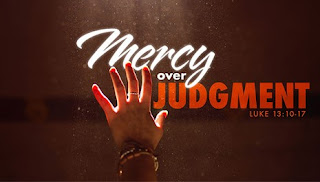Some years ago, my habit was to begin my prayer walks by asking
Father what was on His mind. Sometimes I'd get a sense of something,
maybe a topic to pray about, maybe something to confess, maybe I
needed to pray in tongues for a bit.
So I'd start with
that topic first. Since those walks were about an hour long, it was
pretty rare that the topic he gave me would take the whole time; at
some point, I would feel a release in my spirit, and I knew I could
go on to other topics on my mind. We had been working with this model
for a couple of years, four or five times a week. It was a good
season.
One day, it might have been a Monday, he asked me
to pray 1Corinthians 14:1: "Pursue love, and desire
spiritual gifts, but especially that you may prophesy." That's an awkward verse for a Presbyterian boy to pray, but that's what I felt him saying. So I spent some time praying through these three points, I felt the
release to go on, and I went on to other topics.
The next day, he gave me the same assignment. That hadn't happened before, but let's be honest: "business as usual" is not a normal model with God. I wondered if maybe I'd missed something yesterday, so I was especially detailed in praying through the verse, but I felt the release to go on, so I did.
One Wednesday, he said the same thing. And Thursday. And Friday. He never said any more about the verse, just that I needed to pray the verse.
We didn't have walks together over the weekend, so I kind of wondered if we were done with that verse.
We were not. Every day that week, he asked me to pray that verse. And every day the next week. And the next.
Have you ever been in a situation where you needed to do the same thing every day, and you didn't see any point in it? Did you get tired of it? Did you grow to resent it? I did. Every day, pray the same three things. It went on for months. I got to the point where I'd grumble out, "Yes, I pursue love, and I desire spiritual gifts, especially that I may prophesy. Am I done? Can we go on now?" This went on for months!
And he was always kind and gentle, and I always felt that sense of release, though very often it was tinged with his chuckle, and we'd go on.
I was confused by the same requirement every day, but it never discouraged me from looking forward to my walks with him. And he was never grumpy, and not nearly as legalistic as I was about it. We had good walks together, covering loads of topics, and though I didn't count on it, his presence was often near. Those were really wonderful times, though they started strangely every time. I never told a soul about that strange season, not even my bride.
About that time, the church that had been our family for years shut down, so we went looking for our next assignment. We eventually found excellent fellowship in a community two counties away. After a while, I wanted to get to know the men in that family, so I signed up for the men's retreat with them.
The fellowship was pretty good, and the meetings were interesting. A remarkably gifted teacher spoke for a bit (good stuff!) and then turned the meeting over to a prophet we knew. This was back at the beginning of the prophetic movement, and is sure was more interesting than the Calvinist church I'd grown up with. Rather exciting, really.
One session, when it was the prophet's turn, he announced that some guys would be feeling a physical sensation in their gut, and would those guys please come forward, because God has something for you. I was hungry enough that I started forward before even checking to see if had that sensation, but by the time I reached the front, there was something that I could identify, so I felt like I wasn't cheating.
The guys that he ministered to seemed to affirm the words he was declaring to them (tears are a good thing, right?) so I waited my turn and enjoyed God's presence in the meantime. Eventually it was my turn.
The prophet slaps a hand on me and announces, "God says that you've been asking him for the prophetic." I remind you of my strange prayer times during that whole season! I felt seriously set up!
As my head was spinning, he went on to say that God was answering my prayer, and I think he said some other things. I confess, I was distracted.
So all those months, God was setting me up. I guess my Calvinist & fundamentalist background got in my way (in our way?), so it seemed he needed to go all "Jehovah Sneaky" on me to get me to get over my prejudices and invite him to work in me.
So I forgave him for the sneaky maneuver. And yeah, I've had a small part to play in the prophetic realm (I still have to tell people, no, I'm not "Northwest Prophet!")
I'm just a very much loved son, playing in the shallower half of that pool. And I'm loving my sneaky Daddy.



.jpg)


.jpg)











